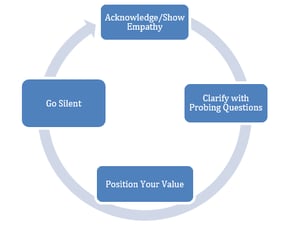The Real Reason Sales Role Play Fails—and How AI Role Play Fixes It
Yesterday, I hosted a live sales training call with a client’s sales team.
4 min read
![]() Dan Fisher
:
Apr 6, 2018 10:13:27 AM
Dan Fisher
:
Apr 6, 2018 10:13:27 AM

 their control and what is outside of their control. While we can't control our candidate's behaviors and the things that they say and do or don't do, there are also several things in which recruiters can exert 100% control over including:
their control and what is outside of their control. While we can't control our candidate's behaviors and the things that they say and do or don't do, there are also several things in which recruiters can exert 100% control over including:It’s important that recruiters focus their time and energy on the things they can control rather than worry about and complain about the things they can’t control.
How Smart, Savvy Candidates Think and Act
Recruiters also need to understand that there are three things that all smart, savvy candidates do:
Whatever the candidate’s reason is for wanting an increase in the pay rate or negotiating on other terms, I suggest you follow the pay rate objection and negotiation resolution model. This is a framework you can follow for effectively addressing and negotiating candidate pay rates in order to reach a win-win  negotiation. As you will notice in the diagram, step three is for the recruiter to position the value of their offer. What this means is the recruiter needs to share with the candidate what he or she stands to gain by accepting their opportunity. This may include the pay rate or salary, health insurance and other benefits. The value the recruiter positions really comes down to how well the recruiter understands their candidate's compelling event and motivators for leaving his or her existing situation and considering your opportunity as well as their decision making process. Perhaps the work environment, hours or commute is really important to your candidate. The point is you need to review your notes and make sure that you understand what is most important to your candidate that is equal to or greater than the additional amount of money he or she is asking for.
negotiation. As you will notice in the diagram, step three is for the recruiter to position the value of their offer. What this means is the recruiter needs to share with the candidate what he or she stands to gain by accepting their opportunity. This may include the pay rate or salary, health insurance and other benefits. The value the recruiter positions really comes down to how well the recruiter understands their candidate's compelling event and motivators for leaving his or her existing situation and considering your opportunity as well as their decision making process. Perhaps the work environment, hours or commute is really important to your candidate. The point is you need to review your notes and make sure that you understand what is most important to your candidate that is equal to or greater than the additional amount of money he or she is asking for.
Going Silent in Negotiations
Silence can be an effective negotiating tactic. Going silent acts as a black hole, just waiting there for someone to fall into. Most people get uneasy with a long, uncomfortable pause and silence. When the recruiter goes silent when negotiating, candidates tend to want to speak to break the silence. The things they say to break the silence often are statements in which they make concessions or weaken their position. Recruiters need to recognize this and act on it. On the flip side, it is important that when recruiters go silent that they are not the first to speak. The idea with going silent is, after you make your offer or position the value your opportunity has to offer, you go silent and remain silent until the candidate responds. The key here is you can’t speak before your candidate. If you speak before your candidate, then you effectively negate the offer you just put on the table, and the candidate will expect you to sweeten the offer you just made. So if you use this tactic, you must be comfortable in remaining silent.
Keep in mind that there are no “winners” or “losers” in a negotiation. A negotiation should be a win-win solution. That being said, recruiters need to understand that they should never give something up without getting something in return. The challenge, however, is figuring out what to ask for in return. Remember any increase in pay rate you offer represents a transfer of profit from your company and your commission to your candidate. To help you plan what you want to ask for, you can use a negotiation trade off sheet. Taking the time to complete a negotiation trade off sheet will significantly increase your effectiveness in trading equal profit for profit when negotiating candidate rates.
Six Rules to Running an Effective Candidate Negotiation
When it comes to candidate rate negotiation, there are six key rules to live by. Before you go into any candidate negotiation you need to understand and be prepared with the following.
What is your strategy for running a successful candidate rate negotiation? What have you found that works most consistently? What do you find most challenging? Let's start a conversation in the comments section below.
Looking for additional insight into interviewing candidates? Download the eBook titled "Executing the Candidate Interview, Five Pillars to Effective Qualification."

Yesterday, I hosted a live sales training call with a client’s sales team.

1 min read
Most staffing firms don’t struggle to scale because their teams aren’t working hard. They struggle because they don’t have a real go-to-market...

In my previous post, How to Prevent Unexpected Contract Terminations, I shared how systemizing consultant and client check-ins at key milestones...